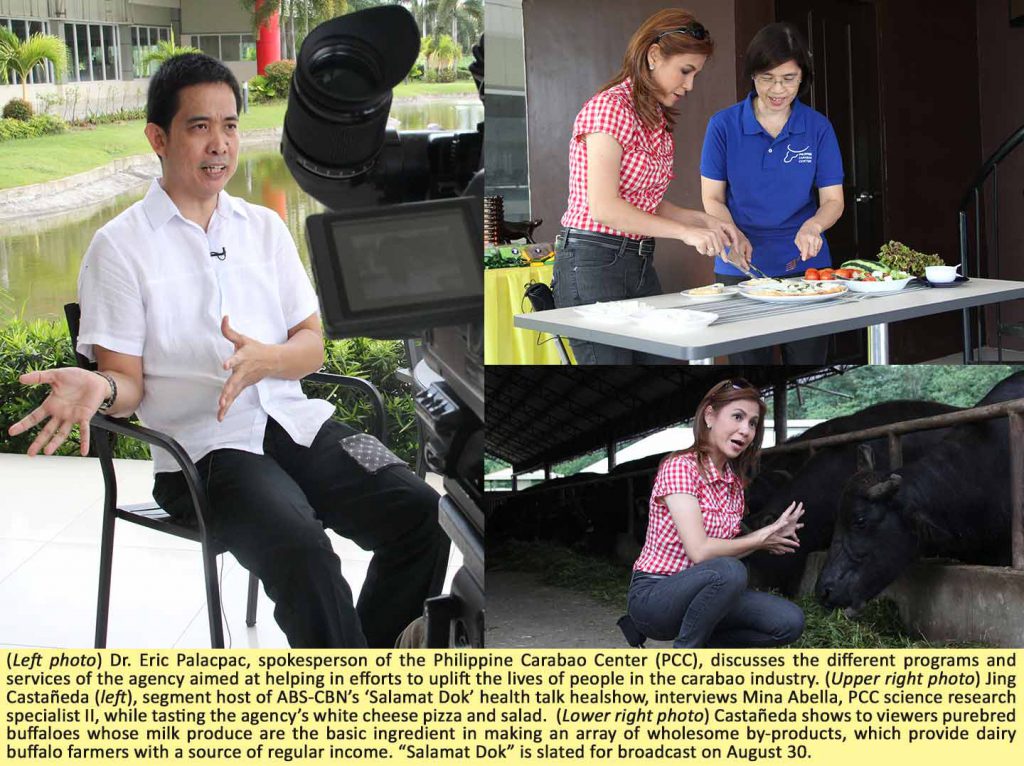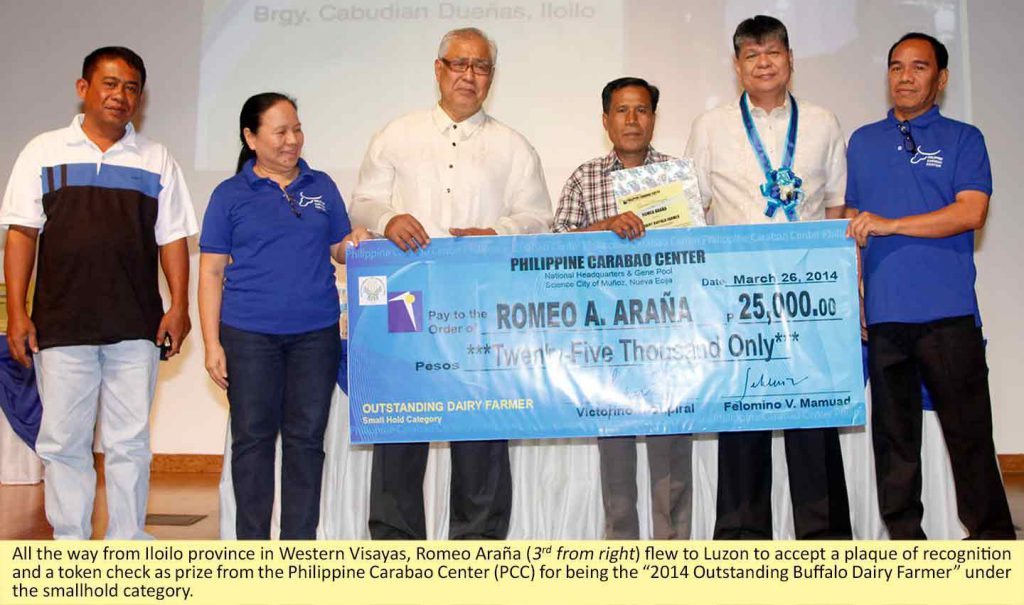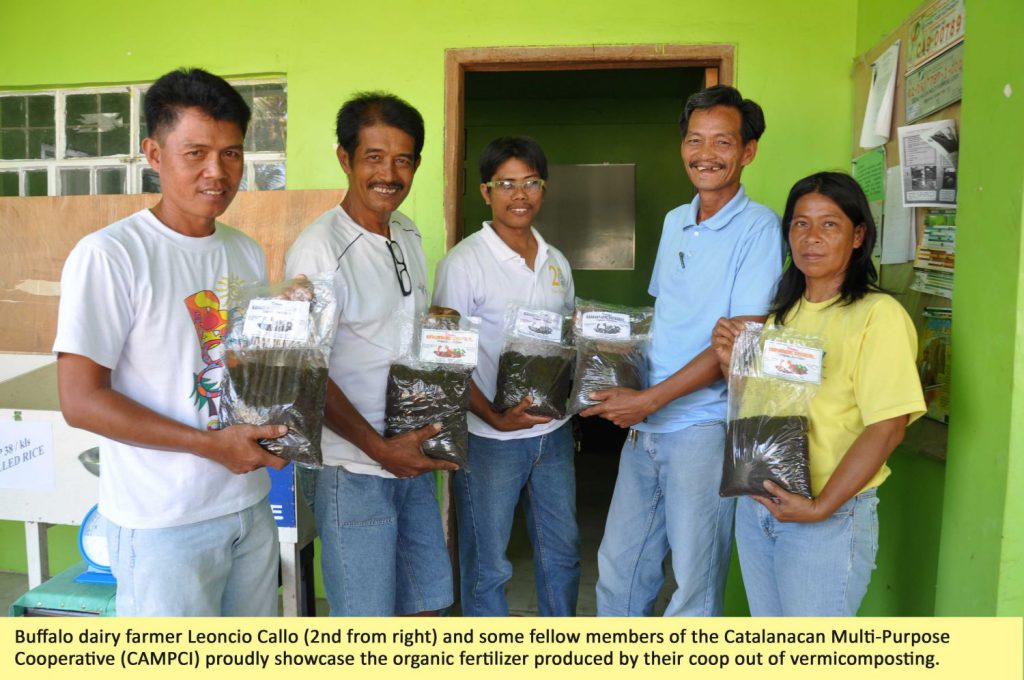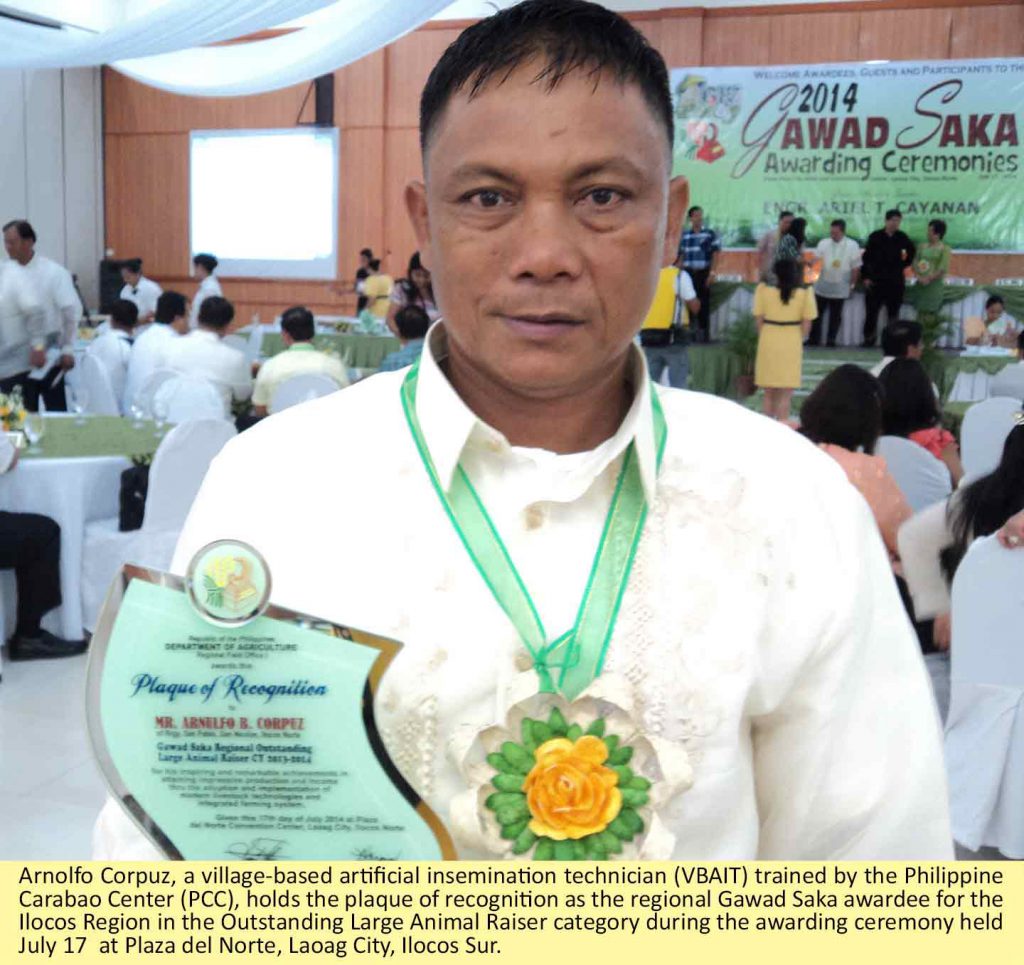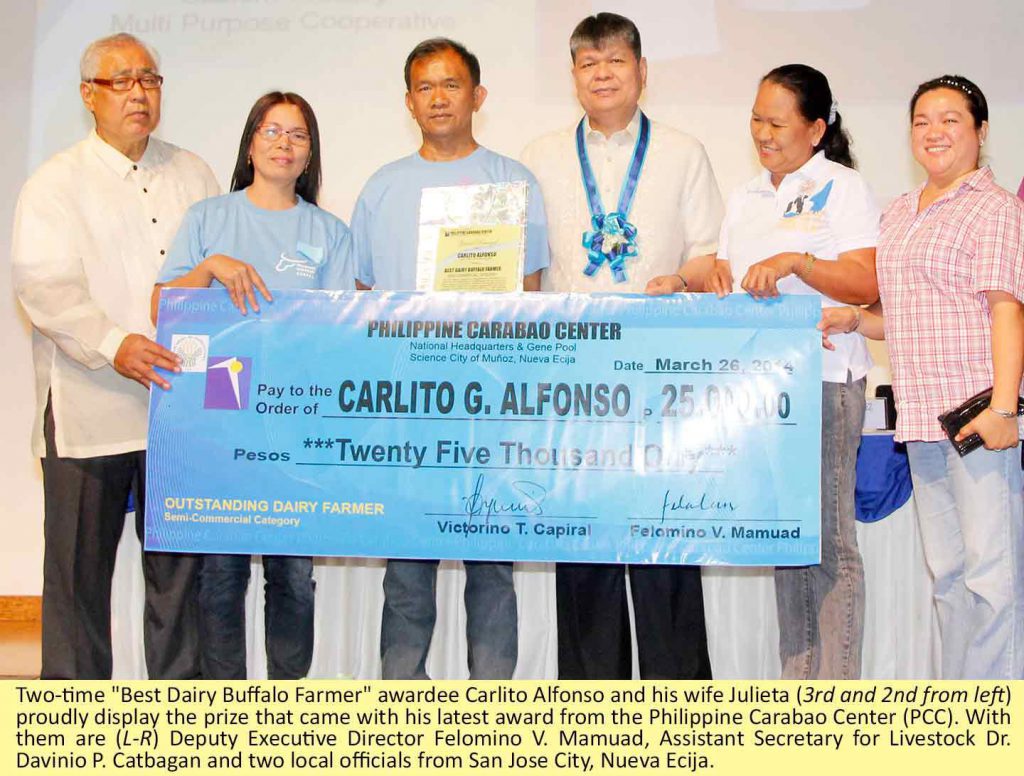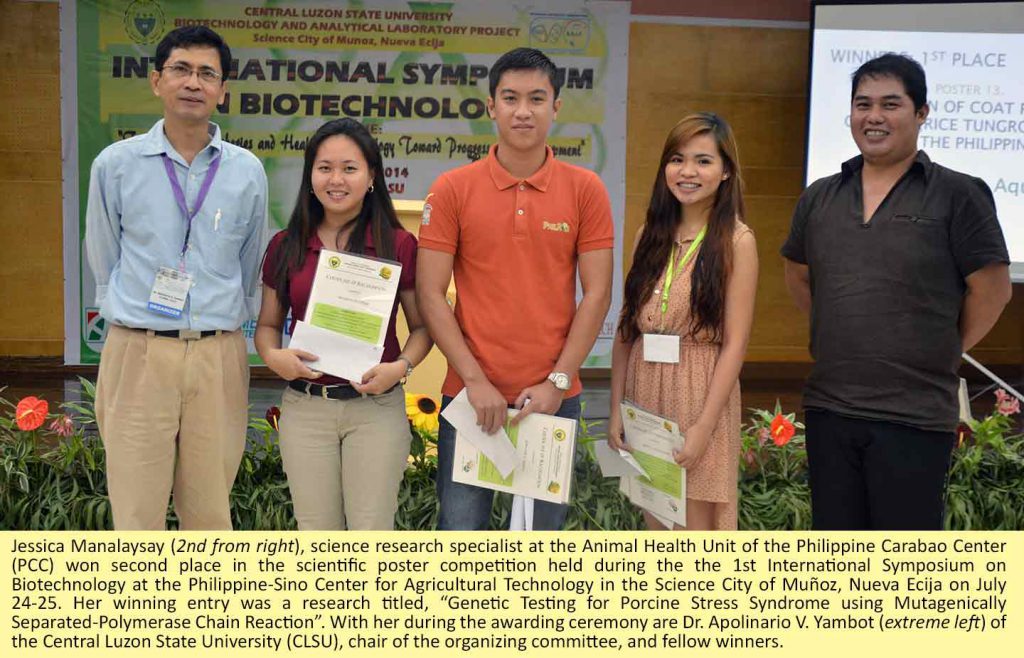Month: August 2014
Life with a dairy carabao: A ‘fairy tale’
Every now and then, we make life-changing decisions. Romeo Araña, 56, made one such decision and has since never looked back. In fact he looks to the future with a lot of optimism.
In 2006 he decided to try his hand at carabao dairying by first having his native albino carabao artificially inseminated with purebred Murrah dairy buffalo semen by a technician from the Philippine Carabao Center based at the West Visayas State University (PCC-WVSU) in Calinog, Iloilo.
Known as “Mang Roming” to fellow farmers and friends, Araña was all but resigned to being a rice farmer in the small village of Cabudian in Dueñas, Iloilo. And then he heard about the artificial insemination activities being undertaken by PCC at WVSU under the Carabao Development Program (CDP). He decided to present his animal for AI.
Luck smiled on Mang Roming. His native carabao gave birth to a female crossbred, which he named “Me”. When the crossbred became fully grown, he did not use it as a draft animal because of a belief that crossbreds were not reliable in the fields. He took good care of “Me”, which eventually gave birth and started producing milk in the latter part of 2011.
At first, Mang Roming was reluctant to regularly milk his crossbred because of another belief among farmers in his village that doing so was not good for the animal.
“I didn’t want to milk “Me” for fear that her body might suffer. But when it was explained to me by the PCC technician that that was not the case and that I could earn money by milking my crossbred on a regular basis, I finally agreed to do it,” Mang Roming recalled. At that time, he added, his son was in his last year in college, thereby requiring a lot of expenses.
Goodness of carabao milk
Mang Roming was elated when, for the first time, he finally received the payment of his milk produce. It was convincing proof, he said, that there indeed is money to be made from carabao’s milk.
During the first and second lactation of “Me”, he was able to earn Php39,130 and Php91,511 respectively. From his milk sales, he was able to provide the daily needs of his family.
“I was very happy because this greatly helped me, especially in supporting my child’s education. I didn’t have to borrow money anymore for his tuition and allowance,” Mang Roming said.
Dairying was now his added source of income, aside from his rice farming earnings, until his son finished college and eventually became a full-pledged teacher. He was also able to have their house repaired.
In March 2014, Mang Roming received what he considers as the start of his “fairy tale”, only that this was very real. As part of the observance of the 21st PCC founding anniversary, he was selected as “2014 Outstanding Dairy Buffalo Farmer” under the smallhold category in recognition of his dedication and efficiency in buffalo-based dairying.
From their small village in Iloilo, his world widened. He flew to Luzon to receive the award in ceremonies held at the PCC headquarters in the Science City of Muñoz, Nueva. Barely two months later, he visited Mindanao to participate in a national congress of dairy farmers in the country during which he was one of the delegates. He was also recognized during a regional event attended by livestock raisers, scientists and government officials.
During these times, he was able to board a plane and a ship, both a first for him.
Hard work pays
Carabao dairying has indeed brought many blessings to Mang Roming and his family. It is a venture that he considers both challenging and rewarding.
He usually gets up at 3 a.m. to bring his animals to a grazing area. At 6 a.m., he brings them back to their pen to wash them and start milking. After this, riding a rented motorcycle, he brings his milk produce to PCC at WVSU office and sells it.
Mang Roming followed this routine during the 300 days that we was milking his carabao, not allowing any difficulty and sometimes bad weather to stop him.
Soon, Mang Roming will go through the same routine when “Me” gives birth again. His heifer is also ready for breeding.
He is aware of the hard work that lies ahead but he relishes it because he knows that he will receive as much as he will give.
Vermicomposting: New business venture of dairy farmers in Catalanacan, Muñoz
In a business venture, the entrepreneur is said to be efficient if he manages to make his business grow and prosper. It goes without saying that the real gauge of a successful enterprise is profitability as shown by regular earnings net of expenses.
This is kind of scenario that Leoncio Callo and his fellow dairy farmers always keep in mind as they go about their daily activities.
Callo is the chairman of the Catalanacan Multi-Purpose Cooperative (CAMPCI) in Catalanacan, Science City of Muñoz, Nueva Ecija. The group is one of the cooperatives being assisted by the Philippine Carabao Center (PCC) in the province, which is PCC’s National Impact Zone (NIZ) under the Carabao Development Program (CDP).
He and his colleagues are in the business of raising dairy carabao for milk production and are earning regular income from such undertaking.
Of late, they’ve gone into a new business venture that, from indications, offers the promise of regular additional income for their group.
“Who would have thought that aside from milk sales, there’s also money to be made out of carabao’s manure?,” Callo wondered aloud.
In 1999, CAMPCI became a beneficiary of the Philippine Carabao Center’s 25-cow module program. Callo earns at least Php1000 daily from milk sales, courtesy of his dairy buffalo herd.
He started with only one loaned buffalo, which has since then grew to 30 animals. He harvests almost 30 liters of milk a day from his lactating dams. There was even a time when his harvested milk reached as much as 46 liters daily.
At present, he has six lactating dams. He sells his milk produce at Php40 per liter to the Nueva Ecija Federation of Dairy Carabao Cooperatives (NEFEDCCO), a group comprised of PCC-assisted primary dairy coops in the NIZ.
According to Callo, in their cooperative, they collect 4,000 liters of carabao milk monthly. It has 87 active members, 34 of whom have carabaos. To date, these carabao raisers have been able to increase their animal holding to a total of 133 animals.
“I can say that there is really money in carabao-raising and I can assure the bright future of my family through this venture,” Callo declared.
A brighter future is in store for Callo and his fellow carabao raisers now that they’re into a new venture: vermicomposting.
Last January, Engr. Ryan Balunhagi of the Department of Agrarian Reform (DAR), proposed and explained to the members of CAMPCI an effective way of making organic fertilizer using carabao manure as substrate. He even encouraged them to participate in a farmers’ field day at Llanera town for them to thoroughly understand and know the proper way of vermicomposting.
Twenty eight out of 34 members of CAMPCI participated in a two-day training on vermcomposting.
“We were taught the proper way of vermicomposting during our training in Llanera. We then made plans on how we can have a budget for this undertaking because there are costs involved,” Callo stated.
The cooperative’s plan to meet the needed budget to start their new business is to lend Php5,000 to Php10,000 to each interested member. This amount will be spent in making vermi-beds and buying African night crawlers or worms.
The interest-free loan, he said, must be fully paid within six months.
“All the products of the cooperative are sold only to members. No outside deals, just straight contract with members. Twenty-four among us got interested,” Callo explained.
A sack of 50kg of harvested organic fertilizer is sold at Php250 to every member. On the other hand, at least 40 sacks of vermicast have already sold by members to the cooperative at Php200 per sack.
CAMPCI’s vermicompost business is mutually beneficial. The coop members patronize the vermicompost that they themselves produce.
“The use of vermicompost lessens farming costs, helps maintain good soil condition and improves harvest,” Callo said.
He said they intend to commercialize their product, but this will depend on the result of laboratory test that has already been done.
“When already commercialized, the packaging title will be ‘CAMPCI vermicast’. We need to include in the package important information such as product contents or elements beneficial to plants. For example, the percentage of phosphorus in the vermicompost will be stated,” Callo revealed.
“Then, as part of our marketing strategy, we will decide on a competitive price for our product. This is very important and will have to be studied carefully. Good sales will result in profits for the cooperative, which, in turn, will mean added income for the members,” he explained.
They sell a 50 kg-sack of carabao manure at Php5, but if it is processed into organic fertilizer, they sell it at Php5 per kilogram.
It’s been 10 years since Callo started using manure from his carabaos as fertilizer for his crops. According to him, even if it’s not processed, he gets good harvests.
Presently, CAMPCI reserved an order of 40 sacks of vermicompost from the members who will soon harvest their vermicompost.
“What is good in this business is that members help each other and strengthens the bond among us. We are aiming for one goal and that is to maximize the potentials of our cooperative to earn additional income. We, as members, will benefit soon from the fruits of our hardships and perseverance,” Callo proudly declares.
PCC at MMSU VBAIT is regional Gawad Saka awardee
Another Village-based Artificial Insemination Technician (VBAIT) trained by the Philippine Carabao Center (PCC) has earned recognition under the Gawad Saka Awards of the Department of Agriculture (DA).
Arnolfo B. Corpuz, 51, has been adjudged as the 2013 Gawad Saka regional winner for the Ilocos Region in the Outstanding Large Animal Raiser category. He received his award in a ceremony held on July 17 at Plaza del Norte, Laoag City.
A resident of Barangay San Pablo, San Nicolas, Ilocos Norte, Corpuz is one of the active VBAITs of PCC at Mariano Marcos State University (MMSU). In 2013 he rendered a total of 170 AI services. He was trained as an AI technician on April-May 2007.
Corpuz himself is a carabao owner. He had only one female native carabao then. He became an AI client of PCC technicians. Not long after his third crossbred was born, William Gudoy, the PCC at MMSU’s AI coordinator, started convincing him to participate in the training on AI and pregnancy diagnosis (AIPD). Corpuz was hesitant at first, considering the distance since the training would be held at PCC at Central Luzon State University, which is located in Muñoz, Nueva Ecija. Moreover, he could not leave his farm and animals for the training that lasts 21 days. Eventually, however, Gudoy was able to convince Corpuz, who submitted all the needed requirements and proceeded to attend the training.
After the training, Gudoy introduced him to the different barangays in San Nicolas town. He stressed to Corpuz that the AI services that he would render would not be given for free since he would be operating as a private technician. They performed estrus synchronization (ES) among the female carabaos to set their estrous cycle. Two days after the ES, Corpuz followed with AI.
Aside from San Nicolas, Corpuz also covers the municipalities of Sarrat, Paoay, Currimao, Pinili and the City of Laoag. He has also extended his services to some parts of Ilocos Sur as well as nearby municipalities of Cagayan.
Corpuz is paid P500 – P700 per AI service and P150 for pregnancy diagnosis. He also collects fees for treating simple animal diseases, a skill he acquired through another PCC training. Farmers also call him frequently to deworm their animals.
Out of his earnings as a VBAIT, he was able to acquire two more crossbreds. Currently, he owns 10 buffaloes, two of which are lactating as of this writing. He sells his milk produce at different offices of their municipal hall. His neighbors are also among his regular customers. It is worth noting that he regularly provides fresh carabao milk daily to feed five malnourished children in his village.
Corpuz tends not only carabaos in his three-hectare farm but also cattle, goats, sheeps, pigs and poultry. He utilizes part of his farm for rice and corn production, while some parts are for forage production, which he uses as feed material for his animals.
Corpuz now competes in Gawad Saka’s national level, and if wins, he will be the second VBAIT of PCC at MMSU to hold such a distinction. To recall, Alex Pasion, also a VBAIT of the center, was a National Gawad Saka awardee in 2012.
The Gawad Saka search is an annual DA undertaking aimed at giving due recognition to deserving farmers, fisherfolk and organized groups who excel in their respective fields and contribute to the general well-being of their community. It started in 1970 with only one category. Today Gawad Saka currently has 24 categories.
Beating the odds: A family’s tale of hard work and success
In 1987, Carlito and Julieta Alfonso, newly married and with a first baby on the way, only had a small piece of farm land and a hundred pesos to build a life on.
Almost three decades later, they managed to parlay what little they had into more than 20 hectares of land, a growing herd of more than 30 purebred dairy buffaloes, and a handsome investment in crops.
Their buffalo portfolio also garnered them respect from their fellow dairy buffalo farmers and for Carlito, the distinction of being a two-time “best dairy buffalo farmer” awardee, a recognition granted him by the Philippine Carabao Center (PCC).
Now with three grown-up children, the Alfonso couple looks back on their long and hard climb towards where they are now, standing on the apex of success.
Humble beginnings
Marrying while still in college, the couple from San Jose City, Nueva Ecija ventured into agriculture as means of livelihood to support their family.
“We really had no capital to invest in a business. We only had a small piece of land that Carlito inherited from his parents. We planted it with onions,” Julieta recalled.
Fortunately for them, the first batch of onions turned in a good profit, which they used as additional capital to rent a bigger farm land. Thus began a cycle that lasted for several years.
“We would borrow money from other people and invest it in rice and onions. We were really lucky that our consecutive harvests turned in big profits. We used our earnings to buy small pieces of land, save some in the bank, and pay our debts,” she added.
Eventually, they were able to gradually acquire a respectable number of hectares of land.
After years of hard work and a determined effort to better their lives, Carlito and Julieta were able to slowly rise from virtually nothing and transform themselves into successful farmer-entrepreneurs.
From a small nipa house, they were able to build a new, bigger dwelling. They also made it a point to continue their studies and finish college. Moreover, they invested on various farm machineries and equipment and kept a growing bank account.
“Businessizing” the carabao
In 2007, the couple decided to expand their business and foray into carabao-raising. Carlito was already a member of the Eastern Primary Multi-Purpose Cooperative (EPMPC), which was then a fast-growing dairy cooperative in their area.
“We heard stories of farmers in our area with thriving dairy carabao business,” Julieta shared.
To get things started, Carlito bought three purebred dairy buffaloes as initial stock, which grew when he became a beneficiary of the PCC’s 25-cow module program.
“We were granted seven purebred dairy buffaloes under the PCC’s animal loan scheme,” Carlito recalled. Two of the loaned animals went to his eldest son, Herson, who had decided to follow in his parents’ footsteps.
Applying the same vigor they demonstrated in their rice and onion farming, the couple and their son took dairy carabao-raising to heart, learning the tricks of the trade and applying technologies that would help improve their new venture.
With Carlito taking the lead, the family continued to expand their herd. They bought additional buffaloes from other dairy farmers using the proceeds from their milk sales. Sometimes, they also sell male calves for additional income.
In 2011, Carlito suffered a heart stroke, which left him partially disabled and unable to undertake heavy farm work. His son Herson took over the reins of their dairy business. He now owns three buffaloes, aside from those belonging to the family.
The Alfonsos are usually the top buffalo milk producer in their cooperative since they have the largest herd. With the raw milk priced at Php42 per liter, which they sell to the EPMPC, they once earned an income of Php60,000 in one month.
Winning performance
The success of the family in dairying did not go unnoticed. In 2011, Carlito was adjudged by the PCC as the “Best Dairy Buffalo Farmer” under the small-hold category. In 2014, he got the same award, this time under the commercial category after his herd grew to 32 animals.
Prior to his stroke, Carlito was also tapped to extend his leadership abilities as chairman of the EPMPC from 2009 to 2011.
“It was probably because of our family’s diligence in taking care of our carabaos and in our farming business that brought us to where we are now,” Carlito said.
Julieta and their son Herson, also an EPMPC member, are mainly in-charge of the whole business but even with his illness, Carlito still monitors it.
“We intend to further expand our herd,” Carlito revealed. Julieta added that they used the cash prize that came with the award from PCC to put up additional pens for the carabaos.
“We want PCC to see where we are spending the money,” she declared.
The Alfonso family has come a long way indeed and can now lay a claim on success. Not surprisingly, though, they see this as an added challenge to work even harder and continue to grow the business that nurtures their family.

